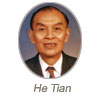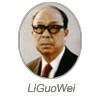AWARDEE OF TECHNOLOGICAL SCIENCES PRIZE
WEI SHOUKUN
Abstract
Professor Wei Shoukun, a metallurgist and Physical-Chemist of Process Metallurgy, also an engineering educationist, was born in Tianjin in 1907. He got B.Sc. in Mining and Metallurgy from Peiyang University in 1929. He studied in Germany in 1931-1936, and obtained Dr.-Ing. in Chemistry from Technische Hochschule Dresden in 1935. He returned China one year later.
In 1936-1946 he joined several universities and became professor, department head or dean of the university.
In 1946 he was invited by Peiyang University to be the professor and head of the Department of Metallurgy. In 1949 he became the president of the College of Engineering of Peiyang University. In 1951 he was the vice provost of Tianjin University. In 1952 he became the provost of the Beijing University of Iron and Steel Technology. In 1979-1983 he was the vice president of the University. Since 1980 he has been elected as the member (academician) of the Chinese Academy of Sicences. Now he is the professor of Beijing University of Science and Technology as Doctoral Supervisor.
He has been the standing member of the Board of Directors of the Chinese Society for Metals. He is one of the founders of Physical Chemistry of Process Metallurgy in China, and has been the frist and second director, and now the honorary director, of the Society of Physical Chemistry of Process Metallurgy. He is also the honorary member of the Chinese Society for Metals as well as that of the Iron and Steel Institute of Japan.
Now he is chairman of the National Terminology Committee on Metallurgy, and also adviser and standing member of the Editorial Board for 7 domestic periodicals.
He has been engaged in the teaching and research work for 67 years. He has published 5 books and more than 150 papers and articles. His research work covers mainly the following fields:(1) comprehensive utilization of domestic ores; (2) theory of activity and its application; (3) the ionization theory of slag desulfurization;(4) the theory of selective oxidation with his proposal on transition temperature; (5) elimination of detrimental elements in complex ores; and (6) the evaluation of interaction coefficients with different methods. As regards the thermodynamics of metallurgical processes he has made attainment of high standard. His new proposals and creative developments have made great contribution to the comprehensive exploitation and economic utlization of domestic complex ores. He has been awarded with many prizes, medals and certificates of merit.






